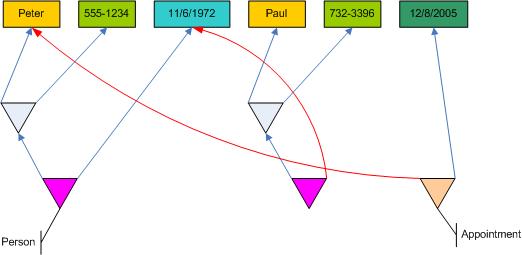Contents tagged with Pile
-
Freeing Data From the Silos - A Relationistic Approach to Information Processing
Current data processing is suffering from the bane of the many data silos. Data is locked up in a hierarchy of containers and can hardly be connected in new ways. Once data has been grouped into relational database tables or object oriented classes, it’s difficult to regroup it or set up new relations. Regrouping would either break existing code or mean duplication of data. New relations would entail schema changes and be limited to connections between containers on only a few levels of abstraction. Products like Microsoft’s WinFS, dynamic languages and database refactoring tools are trying to overcome this lamentable state of data processing while having their own perspective on it.
-
The Original Pile Engine Demystified
If you´ve followed my postings on associative/relationalistic approaches to information representation and were interested in implementations of the Pile concepts (see [1] and [2] for words from the horse´s mouth) you might also have stumbled across a C implementation of a so called Pile Engine at the sourceforge site of the project. (You can find my implementation there, too. But it´s in C#.)
-
Software as a poly-hierarchical mesh
I fired a little too fast when I did my previous posting. Although I wouldn´t say what I wrote is wrong, I´d say it´s not in proper shape yet. There are quite some aspects (sic!) to take into account concerning software design and I´m not yet satisfied with what I have. Software Cells and Software Universe was a good starting point, they help a lot in practice - but still they are limiting and need to be refocused. So for the moment you should forget about the "Classifyiing bubbles" part of the previous posting, where I introduced very concrete levels of abstraction for software. They are not entirely wrong, but I´d like to present them differently in the future. However, I´m still content with the new emphasis I put on edges! They will become even more important today.
-
Building an associative (data)base - or: The Pile thinking applied
Ok, finally - after another digression on Pile fundamentals (and I guess, more needs to be said, but not right now) - I´ll quickly describe my prototype implementation of a Pile engine as well as a Pile agent/client to use it for searching in plain text files.
-
Folding the informational space - or: How Pile lets you transcend hierarchies of data
After some philosophical digressions now on to "More matter, less art" as Hamlet´s mother says. Lets step up the ladder of abstraction and look at how to put the elementary particle, those associations, to some tangible use. How about implementing a little full text search application? That´s what I did to check my understanding of Pile. Although there exists such an application at pileworks.org, I thought it would help me more to try to build it myself instead of just studying existing code.
-
Data is just an abstraction of associations - or: A philosophical interlude
In my previouse posting I´ve described the Pile view of the "world of data": focus on associations, not data. Todays I wanted to put meat on this theoretical skelleton and show you code I wrote. But first let me insert a little philosophical deviation. It might help to distinguish Pile from other (more or less novel) approaches to "data management" - and either draw more fire from the RDBMS camp or drive them off altogether :-) We´ll see...
-
Beyond WinFS - Let associations rule! - or: An introduction to Pile for mere mortals
Yesterday I wrote about why I think WinFS is a step forward - but in the end will not really solve the problem of the penned up data. WinFS´ data units (the objects, e.g. contacts, appointments and what not) simply are still too coarse grained. And even though WinFS puts relations between data units (or entities) more into the center of the stage, it is still bound by the general world view of "data is most important". However, as long as data is in the focus, associations between data are second. And as long as associations are second, we´ll have a hard time to map the multi contextuality of real world entities to software.
-
Musings on relations - or: WinFS is not enough
Have you had a look at WinFS? No, you should. It´s cool. Or maybe I should say: It could be even more cool, if it didn´t stop too early.
-
Storing Relations revisted - The hanging trees of Pile

-
Storing Relations Instead of Data - Just a cool idea or a revolutionary new data storage paradigm?
Well, this idea of storing relations instead of data sounded very interesting - even though I did not fully understand it. And I guess, I still do not fully understand it - but Peter Krieg got me hooked. I´m always open for unusual cool new ideas, and this seems to be one. Later that day he did a keynote titled "When Powerpoint meets Doom" where he tried to explain the idea to a larger audience. Reactions where mixed, but I immediately ran out to get his book "Die paranoide Maschine - Computer zwischen Wahn und Sinn". (Sorry, this book is only available in German; but nevertheless I can recommend it for his quite refreshing view on what computers are and how they need to change, if we want them to become more "intelligent".)